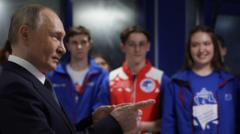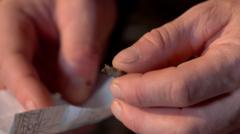President Vladimir Putin, speaking in Murmansk, Russia, commented on the intensifying geopolitical competition in the Arctic, specifically noting Donald Trump's interest in acquiring Greenland. While his remarks were not critical of the U.S. plans, they suggest both nations may seek cooperation in the region, despite the ongoing war in Ukraine and differing political landscapes under Biden and Trump.
Putin Acknowledges Trump's Interest in Greenland Amidst Arctic Geopolitical Tensions

Putin Acknowledges Trump's Interest in Greenland Amidst Arctic Geopolitical Tensions
During an Arctic Forum address in Murmansk, President Putin recognized Donald Trump's plans for Greenland, signaling a potential thaw in U.S.-Russia relations while reaffirming Russia's intent to dominate the Arctic.
In Murmansk, the largest city within the Arctic Circle, President Vladimir Putin recently declared his intention to bolster Russia's prominence in the Arctic amid growing geopolitical competition. He specifically referenced former President Donald Trump's proposal to purchase Greenland, a territory with significant strategic and resource potential. Putin's statement highlighted a new dynamic; he refrained from criticizing Trump, which may signal a moment of opportunity for U.S.-Russia relations as both countries navigate complex geopolitical waters.
"In short, America's plans regarding Greenland are serious," Putin asserted during his speech at the Arctic Forum. "These plans have deep historical roots. The U.S. will systematically continue to advance its geo-strategic and economic interests in the Arctic." His comments stood out particularly given his country's history of territorial expansion and ongoing invasion of Ukraine, a topic he seemed to avoid discussing directly.
Under President Joe Biden, the rhetoric between Moscow and Washington has been notably adversarial. However, recent exchanges suggest a potential softening of attitudes. Kirill Dmitriev, Putin’s envoy for foreign investment, expressed openness to U.S. collaboration in the Arctic, citing possible joint ventures in logistics and other sectors—conditional upon the resolution of the Ukraine conflict.
Dmitriev noted, "We are open for investment cooperation in the Arctic. That could be in areas beneficial to both Russia and the U.S." His work already involves dialogues with American officials, signaling an eagerness from Russia to engage economically, even amidst political strife.
The U.S. response remains complex, as there are indications of a significant shift in perspective. Some former officials, like Trump’s envoy Steve Witkoff, seem to accept Russian narratives about territories under Moscow's control in Ukraine, suggesting a converging dialogue between former U.S. officials and Kremlin interests.
Nikolai Patrushev, a longtime Putin aide, spoke candidly about the changing political landscape in the U.S., reflecting on the varying approaches of past administrations. While acknowledging the competitive nature of U.S. politics, he indicated a belief in a multipolar world emerging that may allow for cooperation.
While the Arctic forum showcased grand ambitions, symbolically marked by a massive inflatable whale installation in Murmansk, public opinions varied among Russians regarding U.S. relations. Some locals demonstrated confidence in Russia’s strength and the potential for Arctic development through international partnerships, while others expressed skepticism about America's status as a "friendly country."
Amidst this intricate backdrop, Dmitriev specifically lauded Elon Musk as a "great visionary," hinting at potential collaborative efforts on innovative projects like Mars missions, underscoring Russia’s interest in fostering ties with influential American figures—even amidst the larger geopolitical complexities in the Arctic.
"In short, America's plans regarding Greenland are serious," Putin asserted during his speech at the Arctic Forum. "These plans have deep historical roots. The U.S. will systematically continue to advance its geo-strategic and economic interests in the Arctic." His comments stood out particularly given his country's history of territorial expansion and ongoing invasion of Ukraine, a topic he seemed to avoid discussing directly.
Under President Joe Biden, the rhetoric between Moscow and Washington has been notably adversarial. However, recent exchanges suggest a potential softening of attitudes. Kirill Dmitriev, Putin’s envoy for foreign investment, expressed openness to U.S. collaboration in the Arctic, citing possible joint ventures in logistics and other sectors—conditional upon the resolution of the Ukraine conflict.
Dmitriev noted, "We are open for investment cooperation in the Arctic. That could be in areas beneficial to both Russia and the U.S." His work already involves dialogues with American officials, signaling an eagerness from Russia to engage economically, even amidst political strife.
The U.S. response remains complex, as there are indications of a significant shift in perspective. Some former officials, like Trump’s envoy Steve Witkoff, seem to accept Russian narratives about territories under Moscow's control in Ukraine, suggesting a converging dialogue between former U.S. officials and Kremlin interests.
Nikolai Patrushev, a longtime Putin aide, spoke candidly about the changing political landscape in the U.S., reflecting on the varying approaches of past administrations. While acknowledging the competitive nature of U.S. politics, he indicated a belief in a multipolar world emerging that may allow for cooperation.
While the Arctic forum showcased grand ambitions, symbolically marked by a massive inflatable whale installation in Murmansk, public opinions varied among Russians regarding U.S. relations. Some locals demonstrated confidence in Russia’s strength and the potential for Arctic development through international partnerships, while others expressed skepticism about America's status as a "friendly country."
Amidst this intricate backdrop, Dmitriev specifically lauded Elon Musk as a "great visionary," hinting at potential collaborative efforts on innovative projects like Mars missions, underscoring Russia’s interest in fostering ties with influential American figures—even amidst the larger geopolitical complexities in the Arctic.




















